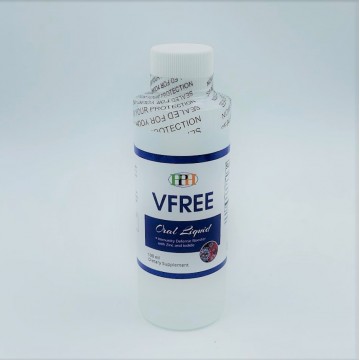VFREE Oral
Availability: 38
- Immunity Defense Booster with Zinc and Iodide
VFREE formula was developed by Clinical Doctor, University professor and Nutritional specialist. The main ingredient was patented in USA and Japan. The active ingredient is stable zinc-polyiodine nano-scale composite particles soluble in water. VFRRE promotes immune system defense against colds and the flu; Zinc and Iodine are immune system boosters that help body combat harmful bacterial and viral infections.
FUNCTIONS:
Zinc is an essential trace element for humans and serves as a cofactor in many transcription factors and enzymes that play a critical role in growth and development, metabolism, immune function, and wound healing.1 This mineral is found throughout the body, in the cells, and is needed as the central ion for over >300 enzymes to work.2 Additionally, it plays a considerable part in healthy immune function. This micronutrient is crucial for maintaining homeostasis of both innate and adaptive immune systems, and its deficiency is correlated with compromised immune cell development and functions.3 One of the major clinical symptoms in zinc-deficient patients is depressed immunity, which leads to adverse clinical outcomes, including increased infections and frequency of disease.3
Studies have shown that this micronutrient is crucial for maintaining homeostasis of both innate and adaptive immune systems, and its deficiency is correlated with compromised immune cell development and functions.4 Clinically, the use of zinc has been proven effective against infectious diseases in the human population. After supplementing zinc in the elderly population, there was a significant decrease in infections in 12 months compared to the placebo group.5 Randomized double blinded placebo-controlled trials have shown that daily zinc supplementation can reduce the incidence and duration of chronic diarrhea by 25-30%6, reduce rates of acute respiratory infection up to 45%7, and can even decrease the duration of the common cold.8
Iodine is recognized globally by the United Nations9 and Food and Nutrition Board10 that supplementation has an essential action on the immune system. Leukocyte myeloperoxidase enzyme uses iodine in cell-mediated immunity and is an important component of many immune cells.11 There have been many historical reports of immune deficiencies among populations of iodine-deficient people.12 A lack of iodine is widespread in modern dietary and lifestyle, with high dietary perchlorate, glucosinolate, thiocyanate, calcium nitrate, cobalt, and rubidium interfere with iodine metabolism and may increase iodine requirements.13 Additionally, iodine also have many other biologic effects, including regulating inflammation, improving phagocytosis of bacteria by immune cells, and boosting the innate immune system.13 Outside of the body, Iodine is used as an extremely effective broad-spectrum antiseptic with low toxicity.14 Iodine is capable of killing pathogens that include gram-positive and gram-negative bacteria, mycobacteria, fungi, yeasts, viruses and protozoa. Most bacteria will die within 15 to 30 seconds of contact,15 and making developing resistance difficult.16 Iodine molecules are difficult to transport, with high instability, since they tend to sublimate.
Suggested Use
5 ml mix with 100 ml water or juice, 2-3 times daily or directed by your healthcare professional.
Ingredients
Zinc Ployiodine nanoparticles, MSM.
Side Effects
No adverse side effects reported.
Storage
Store in a cool, dry place, away from direct light. Keep out of reach of small children.
Reference
1. Dardenne M. Zinc and immune function. European journal of clinical nutrition. 2002;56(3):S20-S23.
2. McCall KA, Huang C-c, Fierke CA. Function and mechanism of zinc metalloenzymes. The Journal of nutrition. 2000;130(5):1437S-1446S.
3. Maares M, Haase H. Zinc and immunity: An essential interrelation. Archives of biochemistry and biophysics. 2016;611:58-65.
4. Haase H, Rink L. Multiple impacts of zinc on immune function. Metallomics. 2014;6(7):1175-1180.
5. Prasad AS, Beck FW, Bao B, et al. Zinc supplementation decreases incidence of infections in the elderly: effect of zinc on generation of cytokines and oxidative stress. The American journal of clinical nutrition. 2007;85(3):837-844.
6. Yazar AS, Güven Ş, Dinleyici EÇ. Effects of zinc or synbiotic on the duration of diarrhea in children with acute infectious diarrhea. Turk J Gastroenterol. 2016;27(6):537-540.
7. Rerksuppaphol S, Rerksuppaphol L. A randomized controlled trial of zinc supplementation in the treatment of acute respiratory tract infection in Thai children. Pediatric Reports. 2019;11(2).
8. Singh M, Das RR. Zinc for the common cold. Cochrane Database of Systematic Reviews. 2013(6).
9. Tomkins A, Watson F. Malnutrition and infection: a review. Malnutrition and infection: a review. 1989(5).
10. Russell R, Beard JL, Cousins RJ, et al. Dietary reference intakes for vitamin A, vitamin K, arsenic, boron, chromium, copper, iodine, iron, manganese, molybdenum, nickel, silicon, vanadium, and zinc. A Report of the Panel on Micronutrients, Subcommittees on Upper Reference Levels of Nutrients and of Interpretation and Uses of Dietary Reference Intakes, and the Standing Committee on the Scientific Evaluation of Dietary Reference Intakes Food and Nutrition Board Institute of Medicine. 2001.
11. Klebanoff SJ, Kettle AJ, Rosen H, Winterbourn CC, Nauseef WM. Myeloperoxidase: a front‐line defender against phagocytosed microorganisms. Journal of leukocyte biology. 2013;93(2):185-198.
12. Black R. Micronutrient deficiency: an underlying cause of morbidity and mortality. In: SciELO Public Health; 2003.
13. Bilal MY, Dambaeva S, Kwak-Kim J, Gilman-Sachs A, Beaman KD. A role for iodide and thyroglobulin in modulating the function of human immune cells. Frontiers in immunology. 2017;8:1573.
14. Kelly FC. Iodine in medicine and pharmacy since its discovery—1811–1961. In: SAGE Publications; 1961.
15. Sue Visser Preventing and treating diseases with iodine https://www.medicalacademic.co.za/post-summary/?post_refered=19218
16. König B, Reimer K, Fleischer W, König W. Effects of Betaisodona® on parameters of host defense. Dermatology. 1997;195(Suppl. 2):42-48.
17. Nimni ME, Han B, Cordoba F. Are we getting enough sulfur in our diet? Nutrition & metabolism. 2007;4(1):24.
18. Grimble RF. The effects of sulfur amino acid intake on immune function in humans. The Journal of nutrition. 2006;136(6):1660S-1665S.
19. Barrager E, Veltmann Jr JR, Schauss AG, Schiller RN. A multicentered, open-label trial on the safety and efficacy of methylsulfonylmethane in the treatment of seasonal allergic rhinitis. The Journal of Alternative & Complementary Medicine. 2002;8(2):167-173.
Pure Power Health Inc. © 2024


